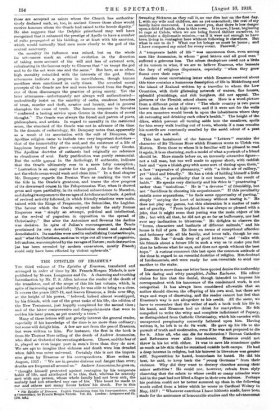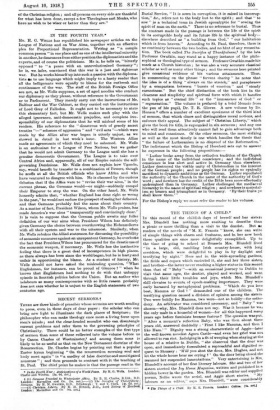THE EPISTLES OF ERASMUS.* Toe third volume of The Epistles
qf Erasmus, translated and arranged in order of time by Mr. Francis Morgan Nichols, is now published by Messrs. Longmans and Co. A charming and touching • Introduotion by Mr. P. S. Allen informs the reader of the death of the translator, and of the scope of this his last volume, which, in spite of increasing age and infirmity, he was able to bring to a close. It covers the years 1517-18, and leaves Erasmus, a little over fifty, at the height of his power, "beloved, indeed almost worshipped, by his friends, with one Of the great tasks of his life, the edition Of the New Testament, just happily completed for the second time ; and of the bitter controversies and disappointments that were to sadden his later years, as yet scarcely a trace."
Many of these letters will not greatly interest the general reader, especially if his knowledge of the time is no more than ordinary; but some will delight him. A few are not from the pen of Erasmus, but were written to him. For instance, the first in the book is from Sir Thomas More telling of the death of Andrew Ammoidus, who died at Oxford of the sweating sickness. Illness, and the fear Of it, played an even larger part in men's lives than they do now. We are apt to imagine that sickness and death were less dreaded when faith was more universal. Certainly this id not the impree- sion given by Erasmus or his correspondents. More writes In August, 1517: "We are in greater distress and danger than ever; deaths- are frequent all around us." Andrew Amrnonius, he goes on, "thought himself protected against contagion by his temperate habit of life, and attributed it to this, that, whereas he scarcely met with any person, whose whole family had not been siek, the malady had not attacked any one of his. This boast he made to me and others not many hours before' his death. For in this
• The Episiles of Erasmus. EngliA Translations from his Correspondence, with a Commentary, by Francis Morgan Nichols. Vol. III. London : Loogmans and CO, Mil, !WU Sweating Sickness, as they call it,rio one dies but on the first day. I, with my wife and children, am as yet untouched; the rest of my family have recovered. I oan assure you, that there is less danger upon a field of battle, than in this town. It is now I hear, beginning to rage at Calais, when we are being forced thither ourselves, to undertake a diplomatic mission,—as if it were not enough to have been living in contagion- here without following it elsewhere. But what is one to do ? What our lot bringa us must be borne ; and I have composed my mind for every event. Farewell."
A "temperate habit of life" was uncommon then, even among men like Ammonius; in whom "good letters and all good men" suffered a grievous loss. The odiusn theologieum owed not a little of its venom to wine; if we are to believe Erasmus, who laments the fury of religious disputants, especially "when they grow
fluent over their cups."
Another most eotertaining letter which Erasmus received about this time contains a humorous description of life in Middelburg and the island of Zealand written by a traveller to whom the Low Countries, with their glistening network of waters, fine houses, splendid pleniehings, and rich burghers, did not appeal. The pictures of the Flemish school charm us. Here is a word-picture from a different point of view, "The whole country is two paces lower than the sea at high-water, and if it were not for the walls the sea monsters would break in upon the inhabitants where they sit carousing and drinking each other's health." The height of the dikes, which prevent all turning aside into the Meadowe, spoik: for him every walk leading out of town, wherein if a man remains his nostrils are constantly assailed by the acrid odour of a peat dug out of a salt soil.
This Mat instahnera of the famoue " Letters " contains the character of Sir Thomas More which Erasmus wrote to Ulrich von Hutten. Even those to whom it is familiar will be pleased to read it again, it is so charming, such a model of what a portrait of a friend should be. More stands before us, an intensely attractive figure— not a tall man, but too well made to appear short; with reddish hair and "eyes a bluish grey with some sort of tinting upon them," a face "expressive of pleasantry," with "a little air of raillery," yet "kind and friendly." He has a trick of holding himself a little to one side, "a peculiarity that is not innate, but the result of habit." He speaks very distinctly and his lobe 10 " penetrating " rather than "melodious." He is "a devotee" of friendship, but not "fastidious in choosing his acquaintance." If this peculiarity entails some separations, "he finds some opportunity of parting," simply "untying the knot of intimacy without tearing it." He does not play any games, but this abstention is a matter of taste not of gravity. "From boyhood he was always so pleased with a joke; that it might seem that jesting was the main object of his life ; but with all that, he did not go so far as buffoonery, nor had ever any inclination to bitternees." He delights to observe the "forms, characters and instincts of different animate," and his house is full of pets. He lived on terms of exceptional affeotion and intimacy with all his family, and loves talk, though he can listen. He has "drunk deep of good letters," and "talks with his friends about a future life in such a way as to make you feel that he believes what he says, and does not speak without the best hope." A curious comment this last upon the common attitude of the time in regard to an essential doctrine of religion. Men doubted of fundamentals, and were ready for .non-essentiak to isead one another to the stake.
Erasmus in more than one letter here quoted denies the authorship of his daring and witty pamphlet, Julia,/ lexclusus. His editor claims for him that the denial, though intended to impress his correspondent with his innocence of the condemned work, is not categorical. It has always been considered allowable that an author should disown the offspring of his own eoul, but there are Ways and ways of disowning, and the reader cannot but feel that Erasmus's way is not altogether to his credit. All the same, We have to remember that the writer of such a book took his life in his hand, and Erasmus had no thirst for martyrdom. He felt compelled to write the witty and oomplete indictment of Papacy, as distinguished from Catholic Christianity, which his enemies with unexpected perspicacity correctly fathered upon him. Having written it, he left it to do its work. He gave up his life to the pursuit of truth and nioderatien, even if he Was not prepared to die for it. After all, who can die for moderation I Roman Catholics and Reformers were alike immoderate. Erasmus could not throw in his lot with either. It Was to save his oensoience quite as much as his skin that he rein/wined outside both camps. He had a deep interest in religion, but his interest in literature was greater still. Superstition he hated, iconoclasm he hated. He did his best, he said, to keep back the "young Germans " from their violence. Why did they want to destroy churohes among their minor activities ? Ile could not, however, refrain from slyly observing that the saints to whose credit so many miracles were laid lathe past had not lifted a finger in their own defence. Perhaps his position could not be better summed up than in the following Words culled from a letter which he wrote to Cardinal Weise), in May, 1617: "Whatever exertions I have hitherto made, have been Made for the assistance of honourable studies and the advericernent
of the Christian religion ; and all persons on every side are thankful for what has been done, except a few Theologians and Monks, who have no wish to be wiser or better than they are."



































 Previous page
Previous page